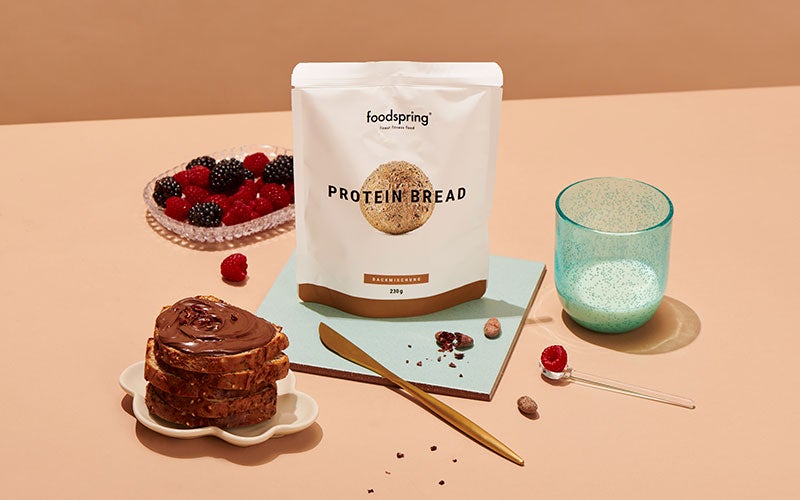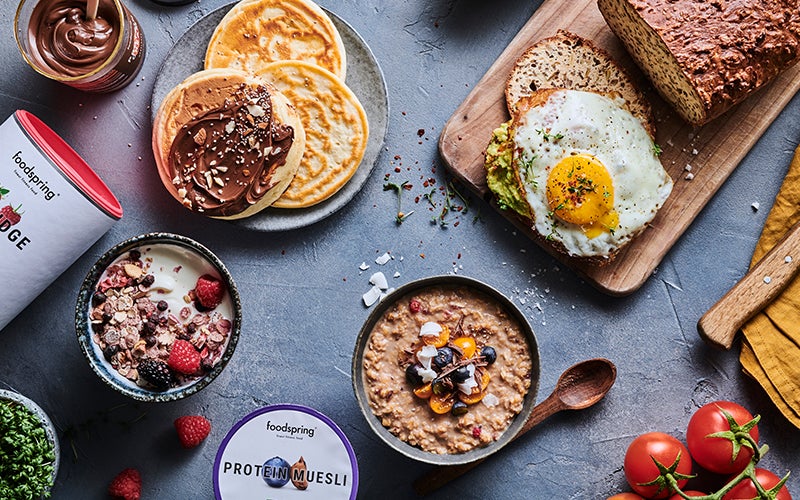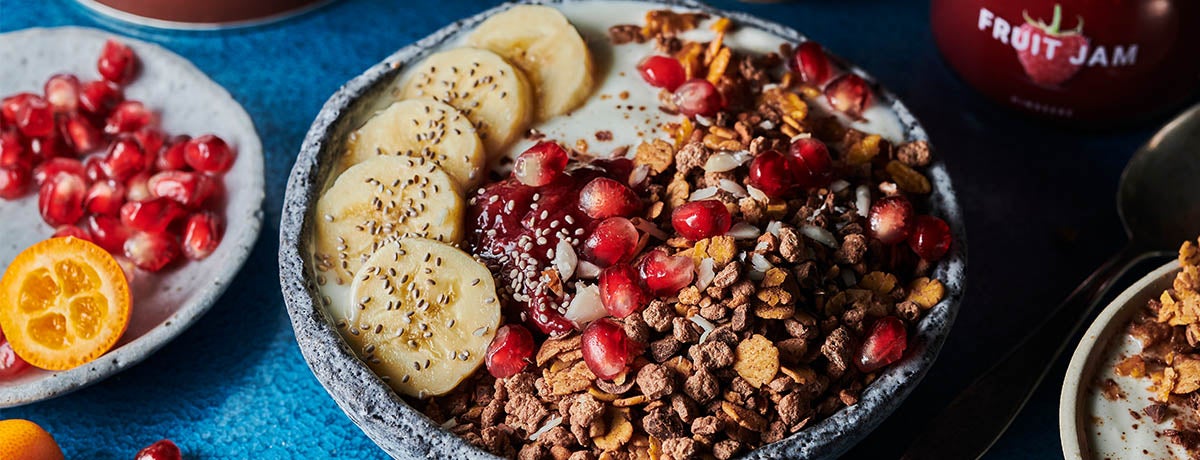3 Golden Rules for a Healthy Breakfast
 ©foodspring
©foodspring
While there isn’t one perfect healthy breakfast that suits everyone, there are a few things you should know about making your first meal of the day a healthy one. Here, we explain everything you should keep in mind.
Do you have to eat breakfast?
Though we’re frequently told that “breakfast is the most important meal of the day,” whether or not it’s actually healthy to eat it is not an easy question to answer.
In one American study1, young women who ate a regular, protein-rich breakfast had less cravings in general during the day and less cravings for salt and sugar overall. And other studies have shown that people who don’t eat in the morning tend to eat more calories than they need over the rest of the day. In the long term, this habit can add up to excess calories and thus weight gain.
Evidence and advice from nutritionists suggests that eating a healthy breakfast is a good idea. When we talk about a healthy breakfast, we’re talking about a balanced meal that covers all three macronutrient categories: proteins, carbohydrates, and fat. But there’s also anecdotal evidence to the contrary. Some people cannot eat without feeling nauseated until at least a couple hours after they’ve woken up. And there are some cases where eating breakfast may even be harmful. In his book, Breakfast Is a Dangerous Meal, Terence Kealey puts breakfast in a totally different light3.
Kealey was diagnosed with type 2 diabetes when he was 62. He explains that regular monitoring of his insulin levels revealed that his blood sugar levels were at their highest in the morning. Even though his doctors told him not to, he decided to stop eating in the morning, and it only took him a few days to notice a difference. His blood sugar levels had dropped significantly not only in the morning, but also at the end of the day. Ever since this experience, he’s been advocating against breakfast — especially for people with diabetes.
At the end of the day, it’s your decision to make. There are plenty of different opinions but the most important thing is to listen to your own body and do what makes it feel healthy.
If you’re having trouble deciding which way to start your day, there’s a simple way to figure it out. Ask yourself, is this a meal that makes you feel happy and healthy? If so, keep eating it without worrying what other people say.
On the other hand, if you find yourself choking down your morning meal because you feel like you have to, it might be time to reconsider even eating it. However, if you frequently find that what you’re eating just leaves you hungry again at 11:00 A.M., that may be because what you’re eating doesn’t have the nutrients you need. While tasty, a croissant and coffee doesn’t have a lot of nutrients and isn’t what’s best for breakfast — after all, that’s just caffeine, carbs, and sugar you’re getting. A balanced breakfast rich in protein, fiber, and complex carbs will be more likely to keep you satisfied until your next meal. Below, we’ll show you what the science says a “healthy” breakfast is, and what does and does not a healthy breakfast make.
What is a “healthy” breakfast?
1. A balance of proteins, carbohydrates, and fats
Numerous studies have found a positive relationship between the amount of protein someone eats for breakfast and their overall eating habits. For one, subjects experienced far fewer cravings when eating a regularly protein-rich diet.
A balanced breakfast also pays attention to complex carbs and fats. Planning your healthy breakfast recipes ahead of time is the best way to ensure what you’re eating has all the nutrients you need. Oatmeal and whole grain cereal are some of your best options. The complex carbs found in either of these options raise your blood sugar levels less suddenly and deliver energy for your brain and your body. Meanwhile, find your fats from options like eggs or nuts.
©foodspring
2. Include fiber, minerals, and vitamins whenever possible
Fiber contributes to a normal digestive function. When choosing a morning meal, opt for a colorful mix of carbs, such as oat and soy flakes, which are also sources of fiber and vitamins. Whole wheat bread and nuts are also great breakfast ideas.
Vitamins contribute to your body’s normal functioning. Bring them into your breakfast by focusing on fruits. Of course, if you react to acidity, especially during the morning, cooking fruit is a good way to make it a little easier to swallow. But keep the temperature low to protect the vitamins!
And some vitamins and minerals are best absorbed when eaten in combination. A few perfect pairings to keep in mind are vitamin D and calcium, vitamin B12 and folate, and magnesium and zinc. And if you don’t think you’ll be able to remember, our Daily Vitamins will do it for you.
3. Eat something that keeps you full
If you don’t eat enough in the morning, you may find yourself overshooting your daily calorie needs over the course of the day. Make your first meal one that really fills you up without weighing you down. Eat slowly and consciously so that you’ll really notice when you feel full.
One Tel Aviv study2 showed that women who ate a large part of their daily calorie requirement in the morning had an easier time reaching their weight loss goals, compared to those who ate more at lunch and in the evening.
Eggs definitely fill you up, but they take time to make in the morning. And yogurt, cottage cheese, and the like can get boring fast.

Our Conclusion
- Start your day with protein, complex carbohydrates, fats, fiber, and vitamins.
- Don’t be afraid to eat a lot of calories in the morning.
- Some studies show that a high-protein morning meal can help with shape goals.
Sources for this article
We at foodspring use only high-quality sources, including peer-reviewed studies, to support the facts within our articles. Read our editorial policy to learn more about how we fact-check and keep our content accurate, reliable, and trustworthy.
- Hoertel u.A.: A randomized crossover pilot study examining the effects of a normal protein vs. high protein breakfast on food cravings and reward signal in overweight/obese “breakfast skipping”, late adolescent girls. Nutritional Journal 2014.
- 2Jakubowic u.A.: High Calorie intake at breakfast vs. dinner differentially influences weight loss of overweight and obese women. 07/2013.
- ³ Terence Kealey (2016): Breakfast is a Dangerous Meal: Why You Should Ditch Your Morning Meal for Health and Wellbeing.


































